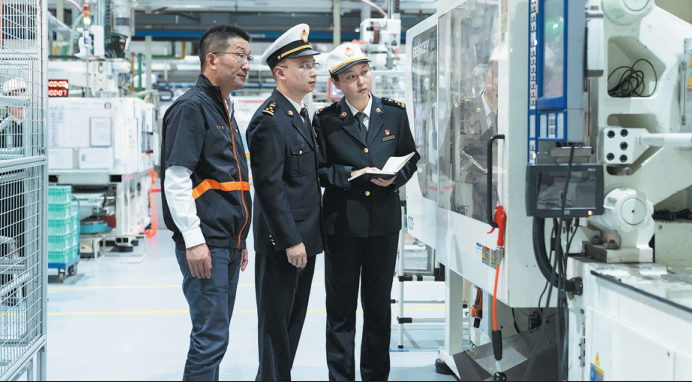
Customs officials conduct field research at an automotive connector manufacturing company in Nantong, Jiangsu province. [Photo provided to China Daily]
China's machinery industry is expected to post stable export growth in 2025 despite challenges posed by aggressive tariff policies by the United States and geopolitical tensions in other parts of the world, leaders from the China Machinery Industry Federation (CMIF) said on Friday.
This resilience is backed by the robust industrial chain advantages of domestic manufacturers, commitment to green transformation, and the integration of DeepSeek's artificial intelligence technologies into their products and service networks.
DeepSeek is a two-year-old startup based in Hangzhou, Zhejiang province, that has created open-source large language models at much lower costs than its foreign peers.
The foreign trade growth of China's machinery industry — a key economic indicator — rose 7.5 percent on a yearly basis to $1.17 trillion in 2024, maintaining the $1 trillion mark in foreign trade value for a fourth consecutive year, according to information released by the Beijing-based federation.
China's exports of machinery products, including excavators, electric and fuel-powered vehicles, wind turbine generators and industrial parts, amounted to $869.36 billion last year, an increase of 11 percent year-on-year, accounting for 24.3 percent of the country's total export value.
Speaking at a news conference in Beijing, Chen Bin, CMIF's deputy director of the expert committee, said the United States' primary efforts to curb China's growth are not focused on traditional machinery manufacturing, but rather on the electronic information industry, including sectors such as semiconductors, telecommunications, AI, cloud computing, big data, and cybersecurity.
"While we recognize that exports may face some challenges this year, we remain optimistic. Chinese companies are proactively expanding their presence in emerging markets and increasing research and development investments to enhance product competitiveness," said Chen.
Despite an unexpectedly harsh international trade environment in 2024, he said Chinese manufacturers still achieved a historic breakthrough and that exports of China's machinery products will see stable growth this year, especially in emerging markets and economies participating in the Belt and Road Initiative.
The export value of China's machinery products to countries and regions involved in the BRI grew by 14 percent year-on-year in 2024, accounting for 51.5 percent of the industry's total exports, according to CMIF data.
Meanwhile, Chinese companies' machinery exports to markets of the Association of Southeast Asian Nations, Africa, and Latin America jumped by 17.7 percent, 12.9 percent and 27.1 percent, year-on-year, respectively.
Norsepower Marine Technology (Yancheng) Co Ltd, a manufacturer of ship fittings based in Yancheng, Jiangsu province, plans to export up to 50 marine rotary sails this year, according to information from Nanjing Customs.
These sails will be applied to various oceangoing vessels. It is estimated that they will reduce annual fuel consumption by 5,000 metric tons and lower carbon emissions by 15,000 tons, said Hai Yunyi, the company's president.
"The marine rotary sails are power devices that utilize aerodynamic effects to serve as an alternative to traditional fuel," said Hai.
As many Chinese manufacturers, particularly automakers, are keen to integrate DeepSeek's open-source large language model into their products, Luo Junjie, CMIF's executive vice-president, said this move will enhance the competitiveness of China's machinery manufacturing industry.
"Even though the entire industry is likely to actively adopt this AI solution this year, the true economic benefits will need to be proven through practice," said Luo, stressing that cutting costs and improving efficiency are key drivers for Chinese companies.
zhongnan@chinadaily.com.cn